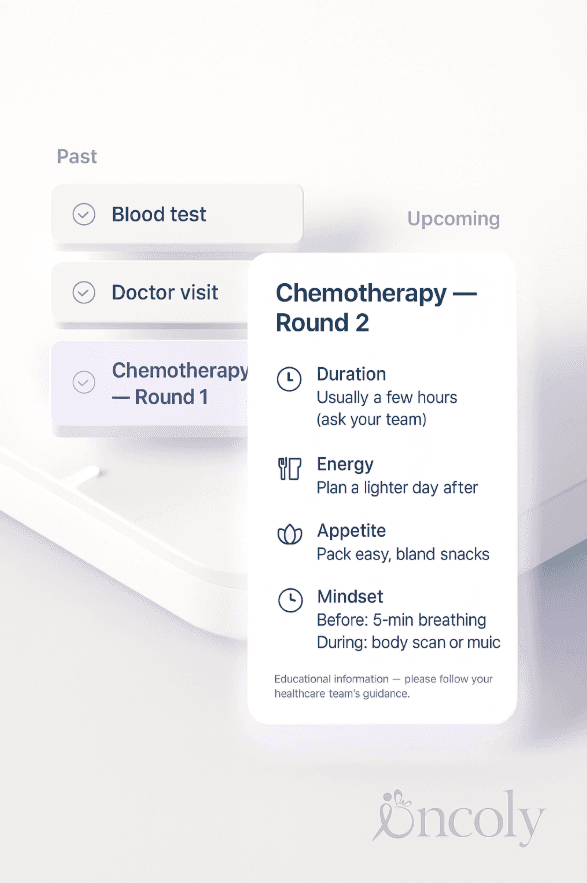Your Treatment Timeline
When everything feels urgent, a simple timeline turns chaos into clear next steps. Oncoly helps you see upcoming visits and tests in one place, with gentle notes on how to prepare, so more of your energy goes to recovery, instead of external factors.

Intro — the days that blur together
I received my diagnosis while I was still training at the Győri ETO academy. Between that moment and my first treatment, I went through what felt like dozens of tests. Most were new to me. I didn’t know what would happen next, what the options were, or how to prepare. My focus scattered across papers, portals and phone calls. Even after treatment started the pattern continued: appointments arrived, but context lagged. Should I rest more this week? What do I bring? What side‑effects might show up and when? I wanted to do everything I could to arrive mentally and physically prepared, but without a clear picture of the road ahead, planning was guesswork.
Oncoly believes this challenge is manageable. With a plain‑language timeline, the journey becomes understandable—and your effort turns into clear goals.
Why a simple timeline helps when everything feels urgent
A timeline puts your upcoming appointments, tests and key milestones in one view. That clarity lets you plan recovery weeks, prepare your mind and body, and coordinate support. You’ll know which days may leave you with lower energy, when to schedule rest, and what to bring to each visit. Families can share the same view, reducing repeated questions and last‑minute stress.
Below is a plain‑language map of the big phases many people encounter. Every case is individual so use this as orientation, then follow your care team’s guidance.
The big phases
1) Diagnosis & staging
In a short span you may have multiple scans, blood tests and specialist visits to understand what your condition is and how far it has progressed. The volume and new terms can be overwhelming.
How Oncoly helps: your tests and appointments appear on one timeline with brief notes in everyday words so you can see the sequence and purpose at a glance.
2) Planning
Your clinical team discusses options and timing. This is when questions matter: goals, concerns, logistics, and who you’d like involved.
How Oncoly helps: you can see what’s coming next and prepare. Gentle prompts help you capture top questions, medications, and preferences, so the plan reflects your life as well as your treatment.
3) Treatment cycles
Chemotherapy, radiotherapy, surgery, targeted or immunotherapies may appear—your plan will be individual. Different treatments can require different preparation and may affect energy levels differently.
How Oncoly helps: before each visit, you’ll see simple reminders on how to prepare, from practical items to bring to mindset and light activity suggestions, moreover a plain description of what the day typically involves.
4) Monitoring & side‑effects
Follow‑ups, labs and imaging check how things are going and guide adjustments. Side‑effects vary widely and timing can be hard to predict.
How Oncoly helps: a straightforward log for symptoms and side‑effects, and an organiser for documents. You can note what changes, when it happens, and what you want to raise at your next visit—without wading through long forms.
5) Recovery & life admin
Rehab, paperwork and a gradual return to routine take time. Support for sleep, stress, movement and meals can make a real difference in how the weeks feel.
How Oncoly helps: after major treatments, you still see a clear timeline and receive gentle, personalised tips on what to avoid, what to prioritise, and how to pace yourself so body and mind can recover together.
Note: Every plan is individual. This article is plain‑language information—always follow your care team’s instructions.
How Oncoly fits, without the jargon
By placing tests, appointments and treatments in chronological order, Oncoly helps you see your journey more clearly and focus on what you can influence today. The four pillars stay consistent: a timeline that shows what’s next, personalised guidance for mind, movement and nutrition, a smart organiser for records and notes, and a private support circle you control. Less time piecing things together; more time for the steps that help you feel ready.
Privacy & safety in plain English
Your health data is personal. Oncoly is built with privacy by design: collect the minimum, protect it carefully, and keep you in control. You decide what to add, who (if anyone) can see it, and when to export or delete it. Oncoly provides educational, plain‑language information to support conversations with your clinician, but it does not replace professional medical advice.
Closing & invitation
As our timeline feature moves toward testing, I keep thinking about those early days on the oncology ward and how a clear, shared plan would have reduced uncertainty for my family. We’re building that clarity now—with you. If there’s a part of the timeline you’d like us to unpack next, tell us.
Follow our journey; beta invitations will roll out here first.
Educational content—please follow your healthcare team’s guidance.